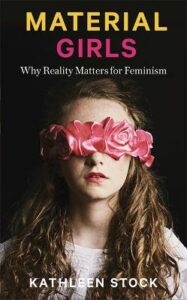
I have been ambivalent about reviewing this book. I generally don’t write about books I read – and I do read a lot of books – but something about that particular book urged a response. It woke me up in the middle of the night, thoughts ready to be written, sentences fully formed in my head. Surely this is a sign that one should write?
Mainly the thoughts were about the persistent feeling of discomfort I experienced while reading it. You may guess, it will not be an overwhelmingly positive review.
Why then review it at all, I asked myself, why not just let it go? Books I disagree with are plenty and they don’t usually trigger such a need for a response. Let me try to explain.
One of the reasons is that it mentions feminism and as a feminist, I have a stake in the way feminism is portrayed. I also believe in political debate and respectful criticism in order to advance feminist theory, find new strategies, grow our movement. It is in that spirit that I write today.
The book is useful in many ways, mainly to bring the issue of “transgenderism” to mainstream audiences. It is written in plain accessible English, no jargon here, which I always appreciate, especially coming from an academic.
The book is aimed at people who may have heard of the tensions around the issue of transgenderism, wondering what it is all about, without having been dragged into its depth. As I have been actively involved in this fight for years, it is fair to say that I am not the target audience.
Nevertheless while not agreeing with every single point here, I appreciated some of the detailed and in-depth work of deconstructing concepts of “woman”, “sex” “gender identity” and “fiction”.
One thing I am not quite sure about though is why there is such an emphasis on the word “feminism” on the front page. The core of the book is philosophical. This is not a feminist book, nor is it really a book about feminism. In fact, the subtitle might have been more reflective of the content if it had been “why reality matters for society”. Something more general. But feminism? I don’t think this is what the book is doing and it feels a bit misleading for the reader who understandably expects to read some feminist content that mainly isn’t there.
In fact, the reader has to wait until the last chapter to find some attempt at feminism.
A point I particularly welcomed was about the importance of intersectionality (the real thing, not the queerified version). Intersectionality, defined by Kimberlé Crenshaw is a tool that allows investigating the complexities of the ways different oppressions (such as oppression based on sex, class, race, sexual orientation…) are interconnected and interact with each other. Stock’s chapter is very useful as a reminder that intersectionality is an essential tool that shouldn’t be dismissed just because it has been used by the woke-boys in the LGBT and the corporate world mainly to score “diversity points”. Reasserting that using intersectionality within a feminist framework is important, is a good point well made, which I agree, is mainly missing from the general debate. The example about women in prison, detailing how sex-based oppression intersects with oppression based on race and class, is very relevant here as this is an area that is not generally put at the forefront of the debate.
Another point that got me nodding was when Stock explains her own use of pronouns. My own position is very different of course as I only ever use pronouns to refer to someone’s biological sex. But I also acknowledge that women’s circumstances might be different and that these play a role in what women can say or think. The freedom of expression I enjoy comes from the fact that I had already lost everything I thought I had when I entered the trans debate so I don’t have a job to lose for disrespecting patriarchal rules. Women need to negotiate their own need for a job or a position as well as their fear of repercussion, with the need for speaking the truth. It is not for me to draw that line for anyone else. Stock explains she respects “preferred pronouns” while acknowledging being uncomfortable with her decision. Yup, welcome to cognitive dissonance, a feeling many women will recognise themselves in. I always value a bit of reflexivity and honesty in writing. It is OK sometimes to say we are not sure, we don’t know, we doubt. These moments can provide better insights than hard-core theory because they expose problems in very relatable ways.
It is also commendable for Stock to defend the right for anyone to choose not to respect pronouns and to call men well “men”.
But why then insist later on the contrary? Why recommend that gender critical women and feminists should go along with the fiction, respect pronouns, be flexible or just make efforts to not be seen as confrontational?
This particular point denotes a deep misunderstanding of feminist principles.
Interestingly one concept that is not deeply deconstructed in the book is “feminism”. Stock spends a bit of time pitting RadFems against LibFems 3rd wavers critiquing both but doesn’t really say what feminism is to her and why it is important. In short, the two confronting viewpoints are “feminism is women working for women’s liberation from male power” – the radfems, versus “Feminism works to bring equality for everyone” – the libfems. The division doesn’t strike me as sufficiently unpacked and lacks depth especially as the book’s mission claims to be about feminism.
My own take is that feminism is for women, I am a radical feminist. And if feminism is about the liberation of all women from patriarchy and if a lot of the colonisation is internalised as Stock rightly points out, then freeing ourselves from the patriarchal way of seeing has got to be one of our goals. Language plays a great part in that. Is it not counter-productive to encourage women who have managed to wriggle free of some of these injunctions, to “be nice” and accommodate men’s fiction once more? Not to mention in contradiction with her own principle.
Many times in the book it is apparent that Stock has concerns, maybe even anxiety about how she is perceived by her academic peers, by someone looking from a queer perspective and by society at large, for holding the views she holds on sex and gender, a concern about being seen as what they call a “terf”. I wondered a few times if that concern is not sometimes clouding her vision.
Being a feminist mainly requires an act of separation from patriarchy and patriarchal values (and some of us make it an act of separation from men). It means firmly anchoring ourselves in our own reality and stopping giving relevance to the world of men, their institutions, their rules, their judgements on us and their fictions.
The specific patriarchal fiction we are talking about here is that there are such things as “transwomen”, that people can actually change sex. Stock seems to be in the process of breaking free from it but it looks like she tries to argue two contradictory things at once and that’s where she loses me completely.
The term “transwoman” is from the start used uncritically. Saying “Trans women are trans women” gives validity to the fiction that there is such a thing as transitioning from one sex to another, even as the whole premise of the book insists on reality and states that no one can change sex. Yes, I agree, men who call themselves “transwomen” are a subgroup of men who behave in a specific way and as such, it is useful to name them differently than men who do not call themselves “transwomen”. Yes, for the purpose of clarity we should differentiate between those two groups of men. The term “transwomen” can be seen as a handy shortcut to do that. But using patriarchal terminology is just another way to give credence to the fiction. Audre Lorde is right, “the master’s tools will never dismantle the master’s house” and this is also true for language. We can’t successfully unpack the phenomenon that is “transgenderism” by using patriarchal language.
Why then attack radical feminism for standing our ground on language?
Why the need to call radical feminists’ criticism of transgenderism ”contemptuous”, “patronising”, “perversely (…) uncharitable”, “inflammatory”?
It is not uncharitable to name men as men. It is a form of resistance to patriarchal language and power. It is rejecting compelled speech. It is also telling the truth. We owe it to ourselves not to participate in the mass-gaslighting “preferred pronouns” are, if and when we are in a position to do so.
As many have said before, comforting people in the delusion that they were “born in the wrong body” is not an act of kindness. Whether these men then threaten us when we speak the truth doesn’t mean we should stop. It’s a clear sign that we should carry on. When some of us speak the truth, it helps other women speak the truth too.
The comment about radical feminists being “blinded with animosity towards the male sex” left me in complete disbelief. Why are women requested to love men in a world where men systematically oppress us, rape us, murder us and then appropriate our oppression, is not explained.
The old motto “she can’t be taken seriously because she is a man-hater” is a common trope we have all heard many times. It is a way to demonise and ultimately silence feminist analyses. Coming from a woman, it reads like a way for Stock to dissociate herself from radical feminists in the readers’ eyes, a way to suggest some feminists are really “feminazi” and “transphobic” over there [points finger] but that she is the reasonable voice of dissent. That is the way the whole “Terf” thing is being used against women to divide us. It is a shame Stock doesn’t recognise that she reproduces the very same dynamic here. I think it’s a wrong approach, it significantly lacks sisterhood and ultimately this strategy will not work to protect Stock from being abused herself. As we have witnessed many times, any criticism of the trans ideology, even the mildest ones, even simple questions, in fact, are ground for backlash, punishment and cancellation
“I know that I will be punished just as much for being an itty-bitty feminist as for going the whole way. And so I go the whole way.”
— Mary Daly
As a radical feminist myself, a lot of my critique runs on those few pages which left me frantically scribbling notes of disagreement on the side of the text.
Julia Long seems strangely singled out there and misrepresented as being THE only voice of radical feminism. Radical feminism as a whole is demonised, but there is also a complete erasure of radical feminist decades of contribution which none of us is taking lightly. Where is Janice Raymond “The Transsexual Empire”? As early as 1979, Raymond was the first to foresee many of the incredible developments we are witnessing today. How can such foundational text be disappeared?
Sheila Jeffreys in “Gender Hurts, “Unpacking Queer Politics” and “Beauty and Misogyny” has spent many years researching and analysing the many complexities and political implications of the queer and transgenderist ideology and its impact on women. How can her work be dismissed as simplistic? This is an old academic trick: in academia, every second-wave feminist analyses is consistently labelled “simplistic, unsophisticated or out-dated”. This is what Stock does here. Accusing Jeffreys of “oversimplification” when she doesn’t take into account most of Jeffreys work is completely unfair. Radical feminists have also written at length highly articulated critiques of postmodernism and queer theory, notably Karla Mantilla’s “Let them eat text” and an entire section in the radical feminist anthology “Radically Speaking” edited by Renate Klein and Diane Bell. None of it is mentioned. This systematic dismissal of radical feminist work makes it look like no one has ever written about the topic before.
But my main critique is about the paragraph on autogynephilic men (AGP). Autogynephilia, a “man’s paraphilia to be sexually aroused by the thought of himself as a female” (Blanchard) is the motivation for a portion of men who call themselves transwomen. Let us be very clear, the harm of AGP men – or indeed any men – in women’s toilets is not about “disrupting social norms” as Stock claims. The harm is the sexual assault of females by males. Daring to suggest that AGP males are in any way stigmatised is an incredible thing to say!
My own research “Lesbian At Ground Zero” on the cotton ceiling reveals that AGP men run wild on lesbian dating apps, absolutely unchallenged. The testimonies of lesbians on the Lesbian Me Too website confirms those findings. Some AGP males are even moderators on lesbian dating apps and forums. Their job description, disguised under empty words such as “inclusivity” is to gaslight lesbians, enforce the myth that some lesbians have penises and break their sexual boundaries. Actual lesbians have been excluded from lesbian dating sites for stating they were not interested in penises. No one is batting an eyelid. It is even encouraged by the LGBT community and most political parties.
AGP men are now welcome in most women’s shelters and in domestic violence women services where their “needs” are taken seriously while their traumatised wives are rejected and denied support when they fail to use the correct pronouns to refer to their abusive husbands. The rare women-only services are violently targeted and lose their funding. AGP men are allowed to invade women’s prisons where they subsequently rape women.
This is not what stigmatisation looks like.
And here is the core of my disagreement with this book. It remains abstract. And in remaining abstract it fails to challenge any hierarchy of power. Manipulating concepts is very useful but women are not concepts. Our oppression is not conceptual. Our oppression happens in real life, in our real bodies.
There is a risk in dismissing the voices of survivors of sexual violence by AGP men, trans widows, cotton-ceiling rape survivors, women in prison or any woman unlucky enough to have come across any AGP masturbating in women’s toilet.
There is a risk in erasing or demonising radical feminist analyses and research when those radical feminists are the only ones who ever look at sexual violence and also the only ones naming men as our oppressors. When we do this, it is no wonder we read strange statements such as women may have “a common cause” with AGPs.
With this book, Stock renders the ideological differences between gender critical people and radical feminists more visible.
I do get the need to appeal to a wide audience but not at all cost. The risk of watering down what we say to appeal to the mainstream is that we lose touch with the reality of women’s lives and fail to report them accurately. Paying lip service to the illusion that some men are “real trans”, just cannot work. “Not all men”, “not all trans” and “Not all AGP” doesn’t function as a feminist analysis.
One cannot speak the truth when we are busy trying to not upset men who have a vested interest in the lie.
When AGP men are presented as stigmatised victims, their own victims get silenced.
When AGP men are platformed at the expense of their victims or at the expense of radical feminists who dare to speak about it, this has political implications for us all.
Reality does indeed matter for feminism.
In the spirit of opening up political discussion and furthering feminist thoughts and practices, I really would like to encourage every women involved in this debate to think collectively about who is being silenced when this happens.

Angela C. Wild is a Lesbian feminist activist, a political artist and a writer.
She is a founder member of the Lesbian activist group Get The L Out UK, author of the first research on the Cotton Ceiling “Lesbians at Ground Zero“, and the creator of Wild Womyn Workshop, radical feminist shop for activists.
























Well thought out and written review. This transgender shit has gone too far because 'woke' liberal support of delusion over reality was not challenged and cold-cocked from the getgo! I pray that this current crisis in Feminism.. or should I say, resurrection, will reverberate well beyond your shores and that we in the US can match your energy and courage.